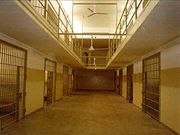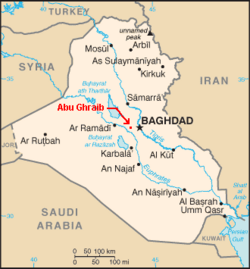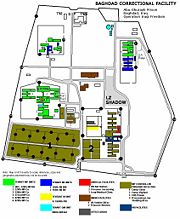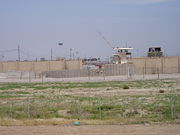Abu Ghraib prison

The Abu Ghraib prison (Arabic: سجن أبو غريب; also Abu Ghurayb) is in Abu Ghraib, an Iraqi city 32 km (20 mi) west of Baghdad. It became internationally known as a place where Saddam Hussein's government tortured and executed dissidents, and later as the site of Abu Ghraib torture and prisoner abuse scandal where the United States military's torture of Iraqi detainees was revealed in a series of photographs published in worldwide news media.
Under Saddam's Ba'ath government, it was known as Abu Ghraib Prison and had a reputation as a place of torture and some of the worst cases of torture in the modern world. It was sometimes referred to in the Western media as "Saddam's Torture Central". The prison was renamed after United States forces expelled the former Iraqi government, which had called it the Baghdad Central Confinement Facility (BCCF) or Baghdad Central Correctional Facility. In May of 2004, Camp Avalanche, a tent camp on the grounds of Abu Ghraib for security detainees, changed its name to Camp Redemption at the request of a governing council member.
The prison complex was built by American contractors in the 1960s, and covered 280 acres (1.15 km²) with a total of 24 guard towers. The size of a small town, the area was divided into five separate walled compounds for different types of prisoners. Each block contained a dining room, prayer room, exercise area and rudimentary washing facilities. Cells contained up to 40 people in a space four metres by four. By the fall of the government in 2003 the five compounds were designated for foreign prisoners, long sentences, short sentences, capital crimes and "special" crimes.

Contents |
Under Saddam Hussein
- See also: Human rights in Saddam's Iraq

Under the government of Saddam Hussein the facility was under the control of the Directorate of General Security (Al-Amn al-Amm) and was the site of the torture and execution of thousands of political prisoners—up to 4,000 prisoners are thought to have been executed there in 1984 alone. During the 1990s human rights organization Amnesty International documented repeated events where as many as several hundred inmates were executed in a single episode. These included hundreds executed in November 1996, and several hundred members of the Shi'a denomination killed in 1998 and 2001. Amnesty reported that it could not produce a complete picture of events at the prison due to government secrecy. It was also the reputed location of Saddam Hussein's alleged shredder.
The section for political inmates of Abu Ghraib was divided into "open" and "closed" wings. The closed wing housed only Shi'ites. They were not allowed visitors or any outside contact.
Coalition prisoners were held and tortured in Abu Ghraib during the Gulf War, including the British Special Air Service patrol Bravo Two Zero.
In 2001 the prison is thought to have held as many as 15,000 inmates. Hundreds of Shi'a Kurds and Iraqi citizens of Iranian ethnicity had reportedly been held there incommunicado and without charges since the beginning of the Iran–Iraq War. Guards fed shredded plastic to prisoners. There are allegations that some of these detainees were subjected to experiments as part of Iraq's chemical and biological weapons program.
The prison was reportedly abandoned just prior to the 2003 invasion of Iraq when Saddam announced general amnesty for virtually all the nation's prisoners. An expansion project began in early 2002 that would add six new blocks to the prison.[1] In October 2002, Saddam Hussein gave amnesty to most prisoners in Iraq. After the prisoners were released, the prison was left empty to be vandalized and looted. Almost all of the documents relating to prisoners were piled and burnt inside of prison offices and cells, leading to extensive structural damage.
In the area of Khan Dhari, west of Baghdad
Mass grave with the bodies of political prisoners from Abu Ghraib prison in Baghdad. 15 victims were executed on 26 December, 1998 and buried by prison authorities under the cover of darkness.
Al-Zahedi, on the western outskirts of Baghdad
Secret graves near a civilian cemetery with the bodies of almost 1000 political prisoners. According to an eye witness, ten to 15 bodies arrived at a time from the Abu Ghraib prison and were buried by local civilians. An execution on 10 December 1999 in Abu Ghraib claimed the lives of 101 people in one day. On 9 March, 2000, 58 prisoners were killed at a time. The last corpse interred was number 993.[2]
Under the US-led coalition
- See also: Abu Ghraib torture and prisoner abuse

Until August, 2006, the site known as the Abu Ghraib prison was used by both the U.S.-led coalition occupying Iraq and the Iraqi government. The area of the facility known as "the Hard Site" is under the complete control of the Iraqi government and is used for housing convicted criminals. The Hard Site is best known from the abuse scandal pictures, the photos of which were all taken in Tier 1 of the complex. The remainder of the facility was occupied by the United States military. It served as both a FOB (Forward Operating Base) and a detention facility. All detainees are housed in an area known as "Camp Redemption." The camp is divided into 5 security levels. This recently built (Summer of 2004) camp replaced the three level setup of Camp Ganci, Camp Vigilant and Tier 1.
The prison has been used as a detention facility, holding more than 7,000 people at its peak in early 2004. The current population, however, is much smaller. This is, in part, because the new Camp Redemption has a much smaller capacity than Camp Ganci alone had. Many detainees have been sent from Abu Ghraib to Camp Bucca for this reason. All people being held by the United States military were housed in Camp Redemption, some of which are suspected rebels, some suspected criminals. Convicted criminals are transferred to the Iraqi run Hard Site.

As revealed by the 2004 Taguba Report, a criminal investigation by the US Army Criminal Investigation Command had already been underway since 2003 where multiple recruits from the 320th MP Battalion had been charged under the Uniform Code of Military Justice with prisoner abuse. Although the US military had already ended the illegal misconduct and was getting ready to try those responsible, in late April 2004, U.S. television news-magazine 60 Minutes broke a story that had been taken from The New Yorker involving regular torture and humiliation of Iraqi inmates by a small group of U.S. soldiers. The story included photographs depicting the torture of prisoners, and resulted in a substantial political scandal within the U.S. and other coalition countries. For more information see Abu Ghraib torture and prisoner abuse.
On April 20, 2004 forty mortar rounds were fired into the prison by insurgents. Twenty-two detainees were killed and 92 wounded. The attack was viewed as either as an attempt to incite a riot or retribution for detainees cooperating with the United States.[3]
In May 2004 the US-led coalition embarked on a prisoner release policy to try to reduce numbers to fewer than 2000. Despite numerous large releases and transfers to Camp Bucca, this goal has yet to be obtained due to the number of incoming detainees.
In a May 24, 2004 address at the U.S. Army War College in Pennsylvania, United States President George W. Bush announced that the prison would be demolished. On June 14 Iraqi interim President Ghazi Mashal Ajil al-Yawer indicated that he opposed this decision, and on June 21 U.S. military judge Col. James Pohl ruled that the prison was a crime scene and could not be demolished.
On April 2, 2005 the prison was attacked by between 40 and 60 insurgents. Between 20 and 44 Americans and 12 Iraqi prisoners were injured in the attack. In another battle the next day, several insurgents were killed and more than forty US soldiers and at least thirteen Iraqi prisoners injured. According to the US military, about fifty insurgents were injured and a few others killed. Al Qaeda in Iraq claimed responsibility for both of the strikes.
During the week ending August 27, 2005, nearly 1,000 detainees at the Abu Ghraib prison were released at the request of the Iraqi government.[4]
On December 4, 2005, Reuters reported that according to John Pace, human rights chief for the United Nations Assistance Mission in Iraq (UNAMI), those held in Abu Ghraib prison were among an estimated 14,000 people imprisoned in violation of United Nations Security Council Resolution 1546. According to Pace,
All prisoners in Iraq except those held by the Ministry of Justice are, technically speaking, held against the law because the Ministry of Justice is the only authority that is empowered by law to detain, to hold anybody in prison.[5]
Transfer to Iraqi control
In March 2006 the U.S. military decided to transfer the 4,500 inmates to other prisons and hand over the Abu Ghraib prison to Iraqi authorities.[6]The prison was reported emptied of prisoners in August 2006.[7] On September 2, 2006, Abu Ghraib was formally handed over to Iraq's government. Ali al-Dabbagh, a spokesman for Prime Minister Nouri al-Maliki, stated "The Abu Ghraib detention facility was handed over to the Iraqi government." The formal transfer was conducted between Major General Jack Gardner, Commander of Task Force 134, and representatives of the Iraqi Ministry of Justice and the Iraqi army.[8]
Detainees
- Ahmad Aziz Rafiq
- Yunis Khatayer Abbas
- Emad al-Janabi
See also
- Human rights in Saddam's Iraq
- Human rights in post-Saddam Iraq
- Abu Ghraib torture and prisoner abuse
- Lynndie England
- Philippine-American War#American torture and scorched-earth campaigns
- Battle of Abu Ghraib
- The Prisoner or: How I Planned to Kill Tony Blair, a documentary about the imprisonment and abuse of one Iraqi journalist, Yunis Khatayer Abbas, and his two brothers at Abu Ghraib prison.
References
- ↑ "Abu Ghurayb Prison" (2005). Retrieved on 2006-03-11.
- ↑ Archaeologists for Human Rights
- ↑ "22 killed in Baghdad mortar attack". USA Today (2004). Retrieved on 2006-03-11.
- ↑ "Nearly 1,000 Abu Ghraib detainees released". CNN.com (2005). Retrieved on 2006-03-11.
- ↑ "America 'abusing' mandate in Iraq", The Age (2005-12-06). Retrieved on 2006-06-09.
- ↑ "US to transfer Abu Ghraib prisoners". Fairfax Digital (2006-03-10). Retrieved on 2008-06-30. "Abu Ghraib prison[...]'s 4,500 inmates will be transferred to a new facility at the nearby Baghdad airport military base and other camps. [...] Abu Ghraib, where US soldiers abused Iraqi detainees, will be handed over to Iraqi authorities once the prisoner transfer to Camp Cropper and other US military prisons in the country is finished."
- ↑ Nancy A. Youssef Abu Ghraib no longer houses any prisoners, Iraqi officials say McClatchy Newspapers August 26, 2006
- ↑ Associated Press (2006-09-03). "Inmates transferred out of Abu Ghraib as coalition hands off control".
External links
- General Janis Karpinski was in charge of Abu Ghraib and now is a talk radio host Interview with Janis2nd hour of the Interview
- Map showing location - globalsecurity.org
- Prisoner abused by American soldiers at Abu Ghraib prison (Iraq, April 2004) (GRAPHIC!)
- Satellite Photograph - Google Maps
- Memo Reveals Bush may have OK'd Torture
- The Abu Ghraib Prison Photos – a collection of graphic photos showing torture and humiliation of Iraqi inmates by a group of U.S. soldiers in Abu Ghraib prison, released by The Washington Post, ABC News, The New Yorker, CBS and Global Free Press
- New Prison Images Emerge – The Washington Post May 6, 2004 article by Christian Davenport
- Chain of Command – The New Yorker May 9, 2004 article by Seymour M. Hersh
- Videos Amplify Picture of Violence – The Washington Post May 21, 2004 article by Josh White, Christian Davenport and Scott Higham
- Use of Dogs to Scare Prisoners Was Authorized – The Washington Post June 11, 2004 article by Josh White and Scott Higham
- After image: the meanings of Abu Ghraib
- Thanks Joe Darby – a site for expressions of support for Joe Darby, the soldier that exposed the graphic photos and video that brought the Abu Ghraib prison scandal to light.
- Abu Ghraib legal news and resources, JURIST
- DocsThatInspire.com Audio interview with Rory Kennedy, director of the new documentary film, "Ghosts of Abu Ghraib"
- HBO: Ghosts of Abu Ghraib HBO's documentary premiered February 22, 2006.
- An Iraq Interrogator's Nightmare, Washington Post 9 Feb 2007
- [1], Prison with a Past by Matthew McAllester